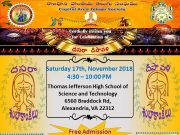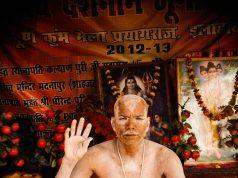Divinity is a recurring concept throughout Hinduism and other world religions. The word ‘divine’ has become associated with God or other supernatural being – a power that is greater than man.
Ancient texts originating from India talk about divinities in reference to the many Gods of the Hindu pantheon. These texts appear to have influenced the myths of later civilisations and modern day religions.
Although it is said there are some 330 million gods in Hinduism, divine Yogis understand there is just One Supreme God – Brahman – which is personified by the Trimurti; Brahma, Vishnu and Shiva.
The Trimurti are the Highest Divinities of the Hindu pantheon. Yet Hindus with an in-depth understanding of the True Self – the Atman, realise that the Trimurti are merely aspects of our inner life.
Essentially, human beings have the potential to become God-like by connecting with the ‘divine’ power that is within us. The divine power within us is the Atman and we connect with the Supreme Universal Divinity which is the mysterious Brahman.
God in Man
Hindu texts written thousands of years ago teach us how to develop the qualities of divinity. Religious texts make no bones that God resides in man. The Svetasvatara Upanishad describes the Atman as the God that resides within.
Similarly, in the Christian Bible, Genesis 1:27 states: “God created mankind in his own image.” Although the Catholic Church personifies God as some supernatural Sky Daddy, the texts imply that man has the divine qualities of God if we choose to discover our true Self – the Atman – the God that resides within.
In the Bhagavad Gita, Lord Krishna talks about the ‘divine mystery’ being a royal secret. Kings, crowns and thus royalty are used in esoteric symbolism to represent Yogis – enlightened beings.
This ‘royal secret’ is knowledge that can only be gained through self-examination. Eventually, the process of self-examination results in a revelation – the point of self-realisation, or if you like, an understanding on an deeper, emotional level.
A spiritual aspirant therefore has to search for the divine power within. And the God in ancient myths demonstrates what we have to do in order to become an enlightened soul and ‘see the face of God.’
Where is the divine power within?
This is a question that is open to debate. Yogis teach us that we can access our divine power through the breath. By breathing from the pit of the stomach and using the whole diaphragm, we fall deeper into trance.
In deep meditation, we are able to access levels of consciousness which connect us to the divine. By training the mind to empty and concentrate on an intention, you can explore and discover the divine in you.
The ancient Chinese call this energy centre the Tan Tien. This is where the chi energy starts. Hindus have a similar concept which explains how the chi energy emerges and passes through the chakra system.
The Tan Tien is situated about an inch below the navel, in the middle of the sacral chakra and the solar plexus chakra. These are arguably the two most important chakras – although this is open for debate and many people will have alternative opinions.
My reasoning behind this statement is because the sacral chakra is the energy centre for creation. The ancient Sanskrit word for the sacral chakra is Svadhisthana which means ‘dwelling place of the Self.’ In other words, where the Atman resides.
Atman remember is the individual God that resides within – your personal divine power that connects you to the Universal divinity which is Brahman.
The Solar Plexus chakra is regarded as the control room. This powerful energy centre can be used for burning away old values that no longer serve us in order to bring in new values. Among the Hindu Gods the Solar Plexus is the divine power of Shiva and Shakti.
So together, the sacral chakra and the solar plexus chakra can be used to help us transform from an ordinary mortal and develop the divine qualities reflected in the mythological Gods.
The qualities of a divine Being
Yogis explain that to access divine knowledge, we must transcend the bounds of reason and logic that we typically apply to things in the physical world.
When we let go and allow our minds to wander beyond the five physical senses, we connect with our divine self and acquire knowledge that enables us to dissolve the ego.
Throughout history we have heard stories about these revelations being grandiose epiphanies – visits from God. In reality, self-realisation is far less dramatic, although is usually accompanied by feelings of light-headedness and a release of tension felt leaving the body. We tend to call them ‘Eureka moments’ or ‘ha-ha moments.’
The truth about yourself comes from within. By internalising your thoughts and examining your actions, you understand more about yourself. This is how to connect with your higher self and expand your conscious awareness.
Understanding Hindu myth acts as a guide. In chapter 16 of the Bhagavad Gita, Lord Krishna explains to Arjuna that divine virtues will come to any man that nurtures the divine qualities.
The Vedas inform us that divine qualities are fearlessness, love, gratitude, appreciation, compassion, patience, honesty, control of emotions and purity of mind.
Men that oppose the qualities of divine beings in Hindu mythology develop demonical qualities that we find in the Asuras; ignorance, anger, arrogance, hate, selfishness, materialism, indulgence, boastfulness and jealousy.
As children we develop the qualities of the Asuras because we do not know any better unless guided by adults; parents, teachers, spiritual leaders etc.
Sadly, many of us our misled by the glamorous ideal of a life you can have. The images painted by magazines, TV and films promise a life of grandeur. In essence, these fantastical ideals steer us away from the inner Truth of the divine Self.
So essentially, you have a choice. Chase a non-realistic dream that magazines promise. Or look within, touch the divine Self and create the life you want for yourself.


























